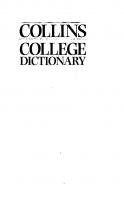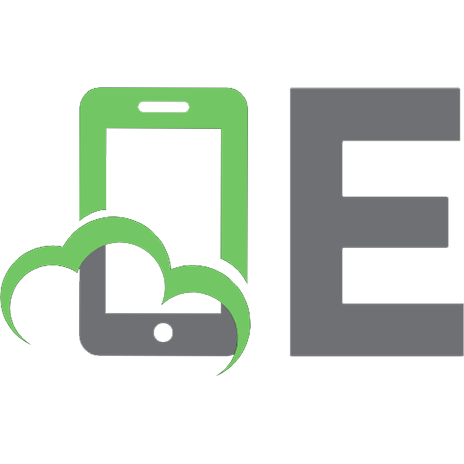Collins College Dictionary (English) 0004709012, 9780004709017
With over 68,000 references, this dictionary pays particular attention to the needs of the user whether in school, colle
289 207 99MB
English Pages 982 [996] Year 1995
Recommend Papers

- Author / Uploaded
- Anon
File loading please wait...
Citation preview
COLLINS COLLEGE DICTIONARY
BANK^/ENGLISH This dictionary has been compiled by referring to the Bank of English, a unique database of the English language with examples of over 200 million words enabling Collins lexicographers to analyse how English is actually used today and how it is changing. This is the evidence on which the changes in this dictionary are based.
The Bank of English was set up as a joint initiative by HarperCollins Publishers and Birmingham University to be a resource for language research and lexicography. It contains a very wide range of material from books, newspapers, radio, TV, magazines, letters, and talks reflecting the whole spectrum of English today. Its size and range make it an unequalled resource and the purpose-built software for its analysis is unique to Collins Dictionaries. This ensures that Collins Dictionaries accurately reflect English as it is used today in a way that is most helpful to the dictionary user as well as including the full range of rarer and historical words and meanings.
COLLINS COLLEGE DICTIONARY
HarperCollinsTWVzsAers
First Published 1995 © HarperCollins Publishers 1995 ISBN 0 00 470901-2
All rights reserved.
Corpus Acknowledgments We would like to thank those authors and publishers who kindly gave permission for copyright material to be used in the Bank of English. We would also like to thank Times Newspapers Ltd and the BBC World Service for providing valuable data.
A catalogue record for this book is available from the British Library.
Entered words that we have reason to believe constitute trademarks have been designated as such. However, neither the presence nor absence of such designation should be regarded as affecting the legal status of any trademark.
Typeset by Barbers Ltd., Wrotham, England Printed and bound in Great Britain by HarperCollins Manufacturing P.O. Box, Glasgow G4 ONB
CONTENTS
Foreword
vii
Features of the Dictionary
viii
Abbreviations Used in the Dictionary
x
DICTIONARY OF THE ENGLISH LANGUAGE
1
Guide to Grammar
978
Guide to Spelling Forms
981
EDITORIAL STAFF Managing Editor Marian Makins Chief Lexicographer Diana Adams Lexicagraph ers
Alice Grandison Sheila Ferguson Andrew Holmes Danielle McGinley Tom Shearer Elspeth Summers Michael Murphy (c o bu il d ) Assistant Lexicographers Ian Brookes Alison Foy Mary O’Neill
Computing Colette Clenaghan Robert McMillan Pronunciation Editor Judith Scott Usage Editor Ronald G Hardie
Australian Advisers G A Wilkes Challis Professor of English University of Sydney
W A Krebs Associate Professor in Literature and Communications Bond University, Queensland Canadian Adviser Patrick Drysdale Editor, A Dictionary af Canadianisms an Historical Principles
New Zealand Adviser Professor Emeritus Ian A Gordon University of Wellington South African Adviser Geoffrey Hughes Professor of English University of the Witwatersrand
FOREWORD The Collins College Dictionary is a completely new text. It is practical, up to date, easy to use, and easy to understand. Every word defined is given as a main entry in a single alphabetical sequence. Every definition is presented in concise straightforward English. Where a word has more than one sense, the one given first is the normal everyday meaning in today’s language. Other senses of a word - for example, historical and technical senses - are explained after the main present-day meaning. Each sense is separately numbered, so that it is easy to see how many different senses a word has and to find the one required. The entries show not only the spelling and meaning of each word, but also its grammatical class. Simple pronunciations are given for words that may be unfamiliar. Guidance is given on appropriate levels of usage: for example, some uses are appropriate only in informal contexts, others in extremely formal contexts. These are clearly marked as such. Words and meanings that have gone out of use are marked as obsolete or archaic: they are included in the dictionary if they are common in the literature of the past. Handy hints on tricky points of correct English are given after many entries. On pages viii and ix you will find a typical page from the dictionary that shows the different kinds of information the entries give. At the end of the dictionary text, there are helpful notes on grammar and spelling rules.
Although this is a relatively small dictionary, the compilers have been able to draw on an unprecedented range of data as raw material. In the first place, the dictionary is based on the Collins English Dictionary databank, which has been painstakingly constructed over the years by Collins lexicographers and their expert advisers in many different fields of knowledge. The work of collecting new words and senses for this databank continues unabated and has provided a number of new words and senses recorded here.
Computer technology has, in addition, provided other kinds of evidence not previously available. The compilers were able to consult the Bank of English, a unique computer-based collection of over 200 million words of written and spoken English. Analysis of this data has enabled the compilers to give the user of this dictionary the most up-todate information about how English is written and spoken today, Doth in the definitions of words and in the thousands of new examples that illustrate meaning. All of the examples of use given in this dictionary are based on an examination of the uses recorded in the Bank of English.
The Collins College Dictionary has thus used the latest techniques to provide a practical and clear guide to-today’s language for today’s users.
vii
FEATURES OF THE DICTIONARY
Tips on Correct English
Parts of speech
Spelling help with changes in form of entry words
a particular occupation or type of work: a school career punctuated with exams. —vb 3 to rush in an uncontrolled way. -adj 4 having chosen to dedicate his or her life to a particular occupation: a career soldier. ► Do not confuse career “rush" with careen “tat”. careerist n a person who seeks to advance his or her career by any means possible, careerism n carefree adj without worry or responsibility. careful adj 1 cautious in attitude or action. 2 very exact and thorough, carefully adv carefulness n careless adj 1 done or acting with insufficient attention. 2 unconcerned in attitude or action, carelessly adv carelessness n carer n a person who looks after someone who is ill or old, often a relative: the group offers support for the carers of those with dementia. ■caress-mi a gentle affectionate touch or embrace, —vb 2 to touch gently and affectionately. caret (kar-ret) n a symbol (1) indicating a place in written or printed matter where something is to be inserted. caretaker n 1 a person employed to look after a place or thing, -adj 2 performing the duties of an office temporarily: a faretaker administration. careworn adj showing signs of stress or worry. _____________ cargo n, pl -goes or esp US -gos goods carried by a ship, aircraft, or other vehicle. Carib n 1 (pl -lbs or -ib) a member of a group of American Indian peoples of NE South America and the S West Indies. 2 any of the languages of these peoples. Caribbean adj of the Caribbean Sea, bounded by Central America, South America, and the West Indies, or the surrounding countries and islands. caribou n, pl -bous or -bou a large North
Numbered definitions ^^Can r




![Collins Dictionary of Statistics [2 ed.]](https://ebin.pub/img/200x200/collins-dictionary-of-statistics-2nbsped.jpg)




